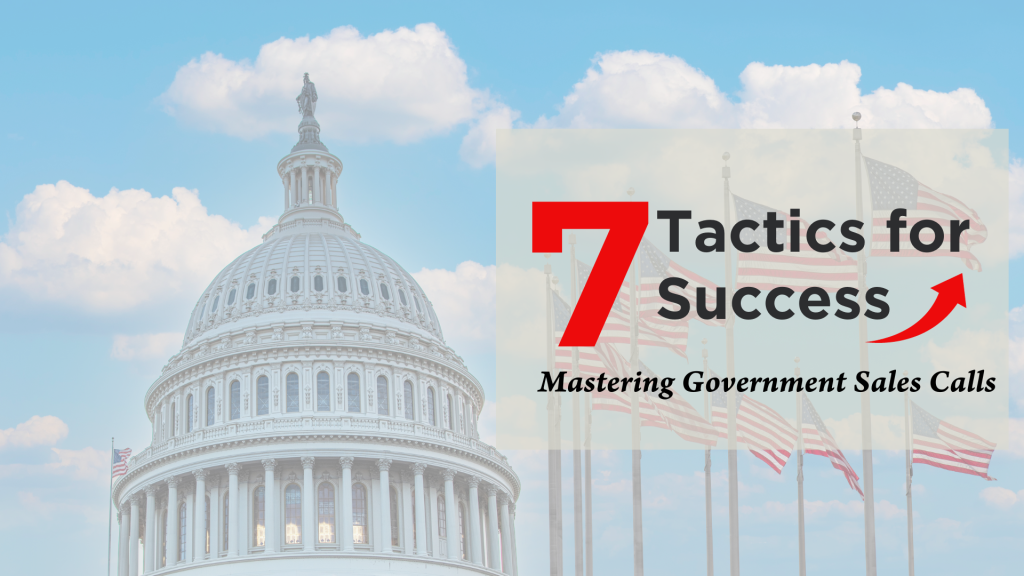Mastering Government Sales Calls: Seven Essential Tactics for Success
November 29, 2023 | Government
Image from Canva
Making successful phone calls to prospective buyers, especially in the government sector, can be challenging. Here is some fundamental guidance to help you navigate this task more effectively:
- Plan and Prioritize: Create a list of prospective buyers and rank them based on their potential value to your business. This helps you focus on the most promising leads first. Allocate specific times on your calendar for making these calls, treating them as important appointments. Also, don’t commit to making all your weekly calls in a one-time slot. If you aim to make 25 calls weekly, break it into five daily calls.
- Research and Personalize: Before each call, research the prospective buyer and their organization. Understand their needs, challenges, and current solutions. This enables you to tailor your pitch, making it more relevant and engaging. Hint: Most agencies have their strategic plans online. Find ways to highlight what you’re selling aligns with their strategic plan.
- Develop a Clear Script: Prepare a script or key talking points for your calls. This should include a brief introduction, the value proposition of your product or service, and a few questions to engage the buyer. Remember, the script is a guide, not something to be read verbatim. Often, buyers may not answer the phone, so be ready to shift and use the script as a guide to leaving a brief but effective voicemail. After leaving a message, follow up with an email, as sometimes phone systems aren’t set up correctly, and they may not know you’ve left them a voicemail.
- Practice and Role-Play: Practice your script and role-play different scenarios with a colleague or mentor. This helps you become more confident and better prepared for different responses from prospective buyers. Are you a solopreneur and don’t have someone? Begin building that relationship now. Ask someone else in your field to help you. You’d be surprised. I wouldn’t be where I am today in this business sector if it were for other people willing to help me. I also practice and role-play with my clients as part of my services.
- Overcome Fear of Rejection: Understand that rejection is a natural part of sales. Very few calls will be successful, and that’s okay. Learn from each experience and use it to refine your approach. Look at it this way: you are trying to get to “no” as quickly as possible. If they say “no, thank you,” then focus on someone who hasn’t given you a “no” yet. Also, in my experience, government buyers are more patient and helpful than their commercial counterparts.
- Follow-Up Systematically: After each call, plan a follow-up strategy and note what transpired. Whether sending additional information, scheduling a meeting, or making another call, consistent follow-up is vital to building relationships and closing deals. Hint: Don’t send all your data about your product or service in your introductory email. If you do that, you have fewer reasons to follow up. Keep your follow-up emails brief. I keep it to three paragraphs with no more than two to three sentences each.
- Seek Feedback and Improve: Continuously seek feedback from your peers, mentors, or prospects when appropriate. Use this feedback to refine your approach and improve your phone conversation skills. Here’s the deal, though. You can’t get better until you start making the calls. I once heard a story about an aspiring content creator contacting a social media influencer and asking them how they made videos. The influencer responded, “Post 100 videos to social media and then contact me”. Why did they say this? They knew they’d learn so much just by doing it. The same goes for making calls.
By integrating these strategies into your routine, you’ll be better equipped to handle phone calls with prospective government buyers, leading to more successful outcomes. Remember, this is a marathon, not a sprint. It will likely take many calls and emails to get a meeting. Once you have an appointment, it will take further engagement before they possibly share an opportunity with you. Be persistent. Ask questions. Offer solutions. Make it easy to buy from you.
Contact me if you have more questions about how you could apply these tactics, particularly to your business.
« Back to Blog Home




